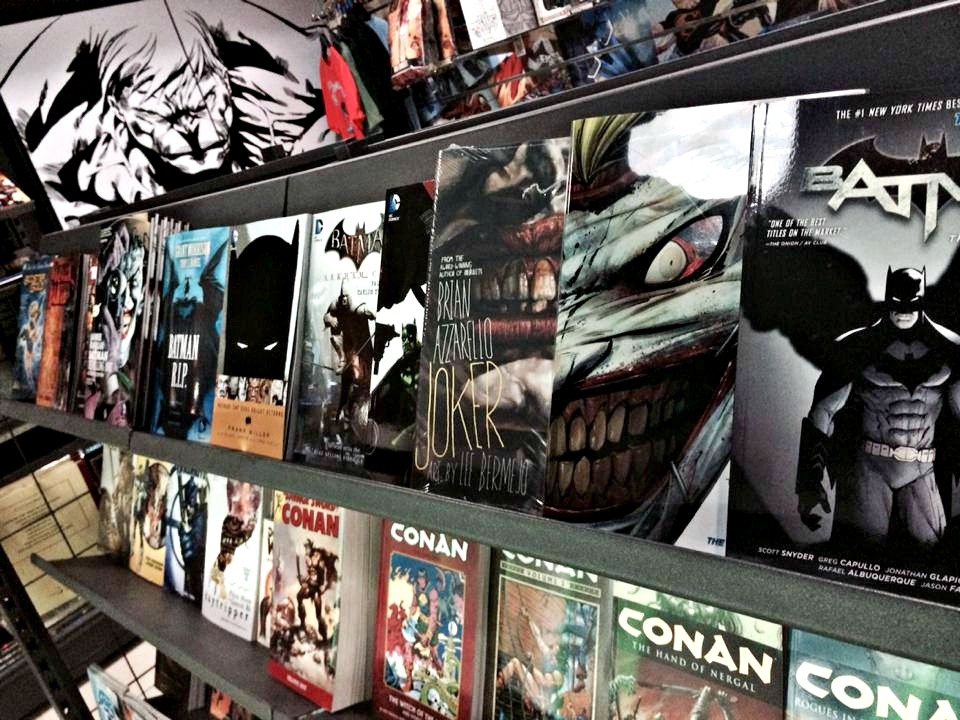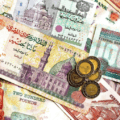With more than a hundred movies and television shows either currently airing, scheduled to be released, and in development, there’s no argument that comic books have taken center stage in pop culture. Young girls (and boys) have Wonder Woman as their role model, “Wakanda forever” is now a common phrase that people use in their day-to-day conversations, but does that mean that the comic book industry itself is thriving in Egypt? I’ve decided to delve deep into one of Dr. Strange’s portals to find out.
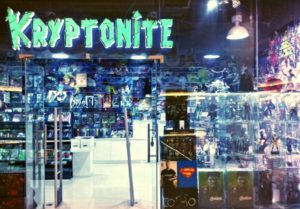
“Customs! They were one of our biggest problems,” Ahmed Abaza, ex-owner of Kryptonite, Egypt’s first comic book shop that opened in Citystars in 2011, tells me. “Allowing merchandise, comics books in particular, was not an easy feat. Not only was the procedure long and could take up to three months, it was also very costly; having to pay an extra 50% for each product on top of shipping,” Abaza added.
Customs weren’t Kryptonite’s only villains, a new one surfaced in the form of the floatation of the Egyptian pound, tripling the prices of everything which made sustaining any type of business, let alone a comic book shop, impossible. “Before this crisis occurred, we would have been able to make enough profits to survive, but it was just very difficult. Especially that the Ministry of Antiquities deemed comic books as luxury goods,” Abaza continued.
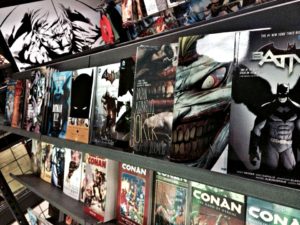
Batman and Conan the Barbarian’s comics used to reign supreme at Kryptonite
In 2016, Abaza and his partner Kareem Awny came to the conclusion of cutting their losses and shutting down both their branches in Citystars and Cairo Festival City Mall. The remaining products that they had were put on sale via their social media channels. However, Awny still held onto his fanboy dreams and went on to open Klash, a superhero-themed restaurant at Point 90 Mall that had a small corner that sold comics, honoring his now-gone store.

Super Stash at Downtown Mall in 2016 — via Cairo Scene
But it wasn’t just Kryptonite that dared to go on this epic Egyptian adventure; in 2014, Super Stash opened its doors in Downtown Mall. The store stood out because it sold classic vinyls and quirky collectibles, on top of comic books – it was a hobbyist’s heaven. “Getting our products into the country was very hard, but I faced something else that was totally unexpected: an unnecessarily competitive industry,” Mahmoud Maklad, ex-owner of Super Stash, tells me. “My store has always been a good sport and I expected the same from Kryptonite, the only other store of our kind in Egypt. Instead of standing together and watching each other flourish and thrive, Super Stash was met with competitiveness that ultimately led to both our demise.” Much like Kryptonite and Maklad’s intuition, Super Stash shut down in 2016.
Comic book shops weren’t the only businesses that attempted to grow their roots into Egyptian soil like a baby Groot (sorry, I couldn’t help myself). Marwan Imam, superhero mega fan and one of the ex-owners of Autostrade, took a big change along with many other comic book fanatics to help nourish this community. “Back in 2011, I created Autostrade, an Egyptian comic book, following the Shonen Jump in Japan with the help of talented comic book artists. Our purpose was to create a space for comics books to be read and followed in Egypt,” Imam tells me.
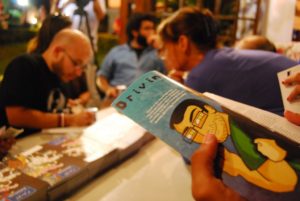
At the launch event for Autostrade in 2011 — via Rowan El Shimi
Readers had the opportunity to vote for their favorite stories, with the least voted ones getting eliminated and the most voted ones hopefully becoming their own books. “We only got one book out and we couldn’t recuperate. We were not just in comic book stores but all book shops as well; distribution killed us. People in Egypt love comics, but they just don’t go out of their way to buy them,” Imam stresses.
“If I am to buy a comic, I would buy a digital version from Comixology (a cloud-based digital distribution platform for comics); it’s easier and cheaper. I buy to support the industry, however, most people just don’t care and would pirate them instead and I wouldn’t blame them. Only a true collector would want the hard copies, this is why Kryptonite and Stash thrived more on action figures than comic books since they can’t be pirated,” Imam continued and explained how the Egyptian economy also doesn’t help the situation whatsoever. “With comics being imported from mostly the US, it becomes irresponsible to pay that amount of money on them with the current economy. That’s why the only comics selling are Mickey, because they’re cheap.”

The cover for Pass by Tomorrow’s first book
After talking to all of these experts in true James Gordon fashion, it started to hit me that maybe, just maybe Egypt doesn’t have enough of a comic fan base as everyone thought. Sheirf ‘Barbatoze’ Adel, comic book artist behind Pass by Tomorrow, shared the same thought. “The Egyptian comic fan base may not be as large as we think, or at least not large enough to sustain a comic book shop that has to pay large rental fees in places like the Fifth Settlement,” Barbatoze explained. “Book prices are also too high for the average Egyptian consumer, especially when translated from dollars and with shipping fees. Not to mention that piracy is a big thing in Egypt.”
When asked about whether the comic book industry would have any hope in Om el Donia, he replied with, “I would say there is hope. We have strong talents in Egypt and the Arab world and people have created pretty amazing stuff. What’s lacking is the business side of things. We need to create a new business model that is profitable for both the publishers and creators. I imagine if we have one big successful comic book project in Egypt, it would open the market to more and more projects.”



















